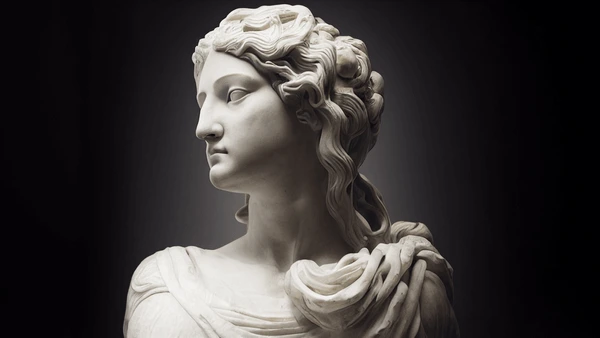Demeter is one of the most well-known goddesses in Greek mythology. She is the goddess of agriculture, fertility, and the harvest and is often depicted holding a sheaf of wheat or a cornucopia. Demeter was also closely associated with the seasons, specifically with the cycle of growth and decay that defines the agricultural year.
In Greek mythology, Demeter was the sister of Zeus, the king of the gods, and the daughter of Cronus and Rhea. Demeter’s relationship with Zeus was complex; she loved and feared him. Despite this, Zeus was known to be unfaithful to his wife, Hera, and he had several affairs with other goddesses, including Demeter. One myth even tells of how her brother Poseidon impregnated her, resulting in the birth of a horse.
Another meaningful relationship in Demeter’s mythology is with her daughter, Persephone. Persephone was kidnapped by Hades, the god of the underworld, and taken to the underworld to be his wife. Demeter was devastated by the loss of her daughter and searched for her relentlessly. Eventually, Zeus intervened and brokered a deal that allowed Persephone to spend six months of the year with her mother and six months with Hades.
This myth is often seen as an allegory for the changing of the seasons, as Demeter’s grief over her daughter’s absence is said to have caused the earth to become barren and cold during the months when Persephone was in the underworld.
Birth Story
Demeter is one of the twelve Olympian gods and goddesses in Greek mythology. She is the daughter of Cronus and Rhea and the sister of Zeus, Poseidon, Hades, Hera, and Hestia. Demeter’s birth story is not well-known, but according to some sources, she was born with her siblings in the ancient world.
Demeter has a complex relationship with her siblings, especially Zeus and Poseidon. Zeus, her brother, is the king of the gods, and she has a close relationship with him. Poseidon, the god of the sea, is Demeter’s bitter rival, and the two have a long-standing feud often reflected in the natural world.
Demeter’s most significant relationship is with her daughter, Persephone. According to Greek mythology, the underworld god Hades abducted Persephone and took her to the underworld to be his queen. Demeter was devastated by her daughter’s disappearance and searched for her relentlessly. Eventually, Zeus intervened and forced Hades to return Persephone to her mother.
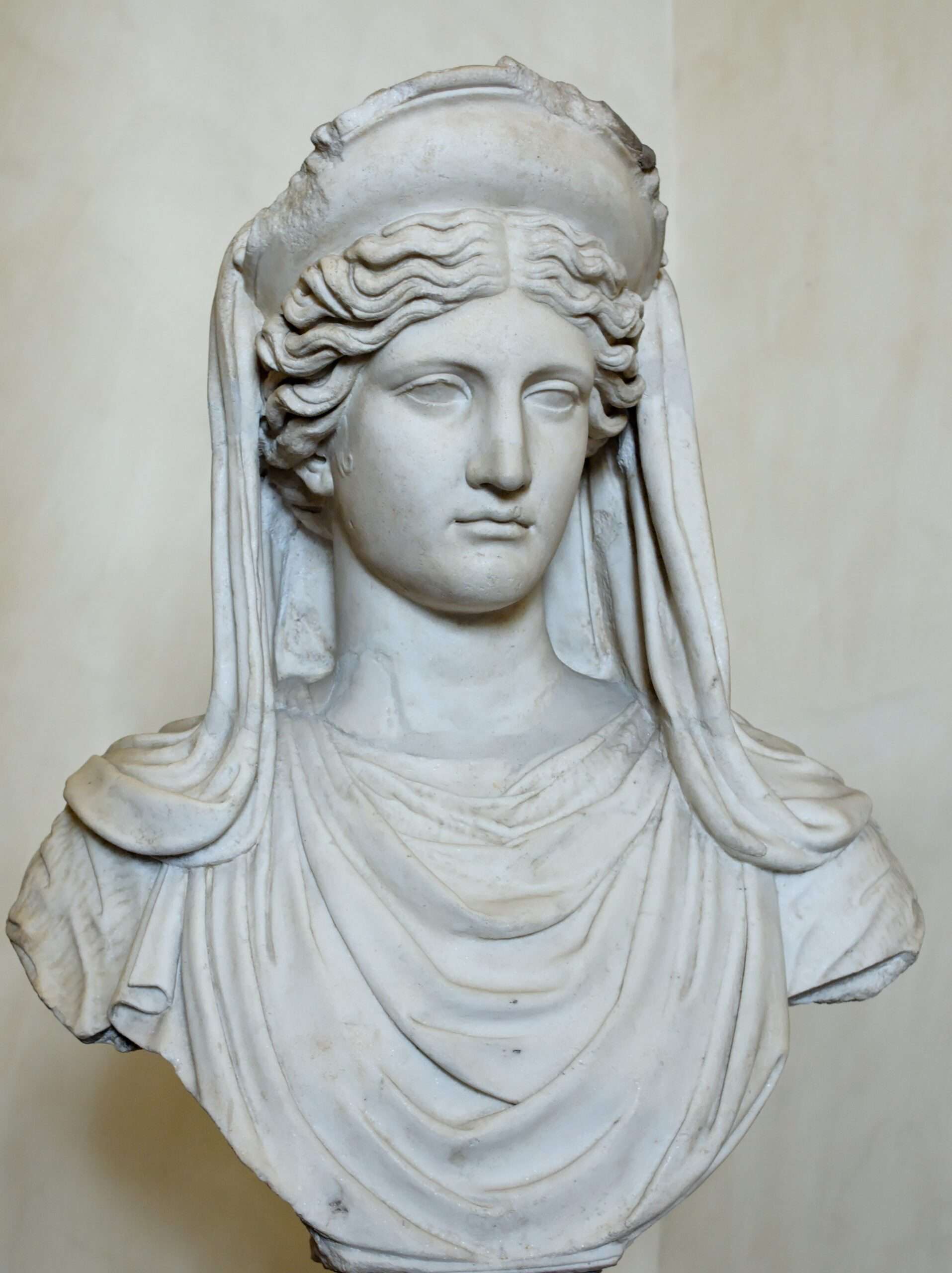
One of the most unusual aspects of Demeter’s story is that she was impregnated by her brother, Zeus. According to some versions of the myth, Zeus transformed himself into a snake and seduced Demeter. This union produced a daughter, Persephone.
Another important figure in Demeter’s story is Helios, the sun god. Helios witnessed Persephone’s abduction and informed Demeter of what had happened. As a result, Demeter became enraged and refused to allow the earth to produce crops until her daughter was returned to her.
In conclusion, Demeter’s birth story is not well-known, but her relationships with her siblings, especially Zeus and Poseidon, are significant. Her most important relationship is with her daughter, Persephone, and her story is intertwined with Helios, the sun god.
Family and Sibling
Demeter was the daughter of Cronus and Rhea, two of the twelve Titans. She had five siblings: Zeus, Hades, Hera, Poseidon, and Hestia. As a member of the Titans, Demeter was a part of a robust and influential family in Greek mythology.
Demeter had a particularly close relationship with her brother Zeus, the king of the gods. Although they were not romantically involved, they often worked together to achieve their goals. For example, Demeter and Zeus collaborated to bring about the birth of Persephone, Demeter’s daughter, who would later become the underworld queen.
Demeter also had a complicated relationship with her other brother, Poseidon. According to myth, Poseidon once pursued Demeter and attempted to seduce her. Demeter rejected his advances, but Poseidon did not give up easily. Eventually, he impregnated her, and their child was born as a horse.
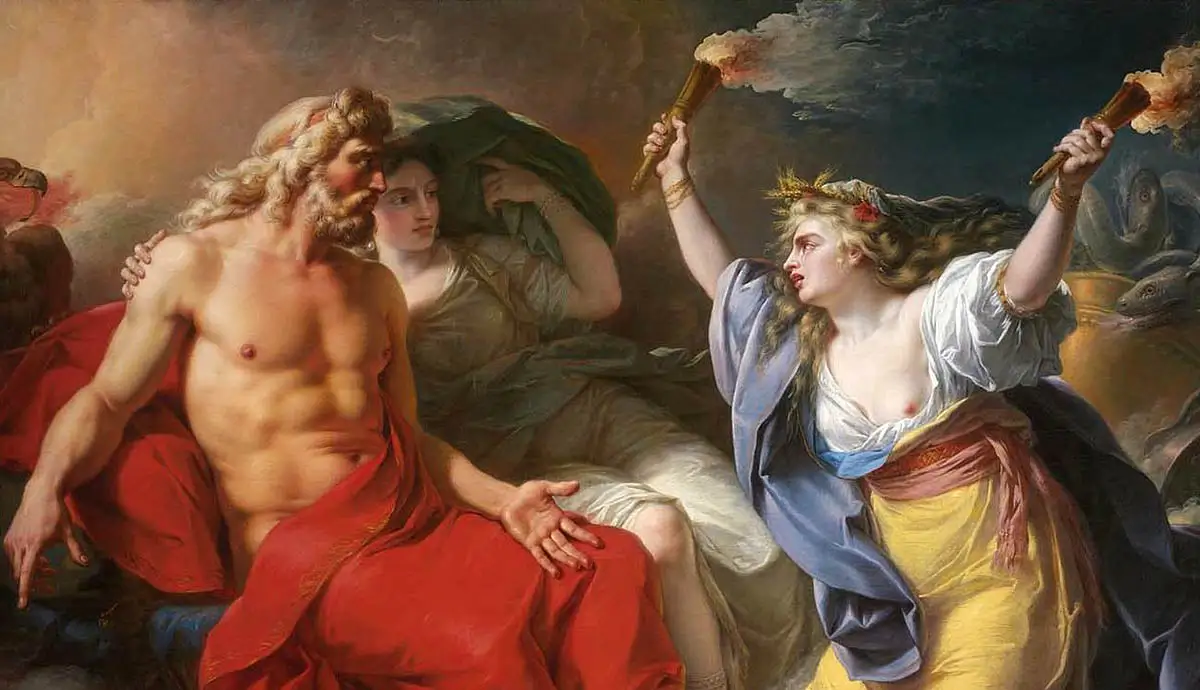
In addition to her relationships with her siblings, Demeter was also closely associated with other family members, including her daughter Persephone and her niece Hecate. Persephone was the product of Demeter’s union with Zeus, and the two had a very close bond. When Hades kidnaps Persephone and takes her to the underworld, Demeter is heartbroken and goes to great lengths to rescue her.
Hecate, on the other hand, was a goddess of magic and witchcraft who was often depicted as a companion of Demeter. The two goddesses were said to have worked together to create the world of mortals and were closely associated with the cycles of life and death.
Demeter’s relationships with her family played a significant role in her mythology. From her close bond with Zeus to her complicated relationship with Poseidon, these connections helped to shape her story and define her role as a goddess of agriculture and fertility.
Marriage
Demeter, the Greek goddess of agriculture, fertility, and harvest, had several relationships with gods, including Zeus and Poseidon. However, her most significant relationship was with her daughter, Persephone.
According to Greek mythology, Demeter was married to her brother, Zeus, who was also the king of the gods. However, their relationship was not happy, as Zeus was known for his infidelity and had many affairs with mortal women and other goddesses. Demeter often felt neglected and abandoned, leading to her becoming bitter and resentful.
Poseidon, the god of the sea, was also said to have had a romantic interest in Demeter. However, she rejected his advances, which led to Poseidon becoming angry and causing a drought that lasted for several years.
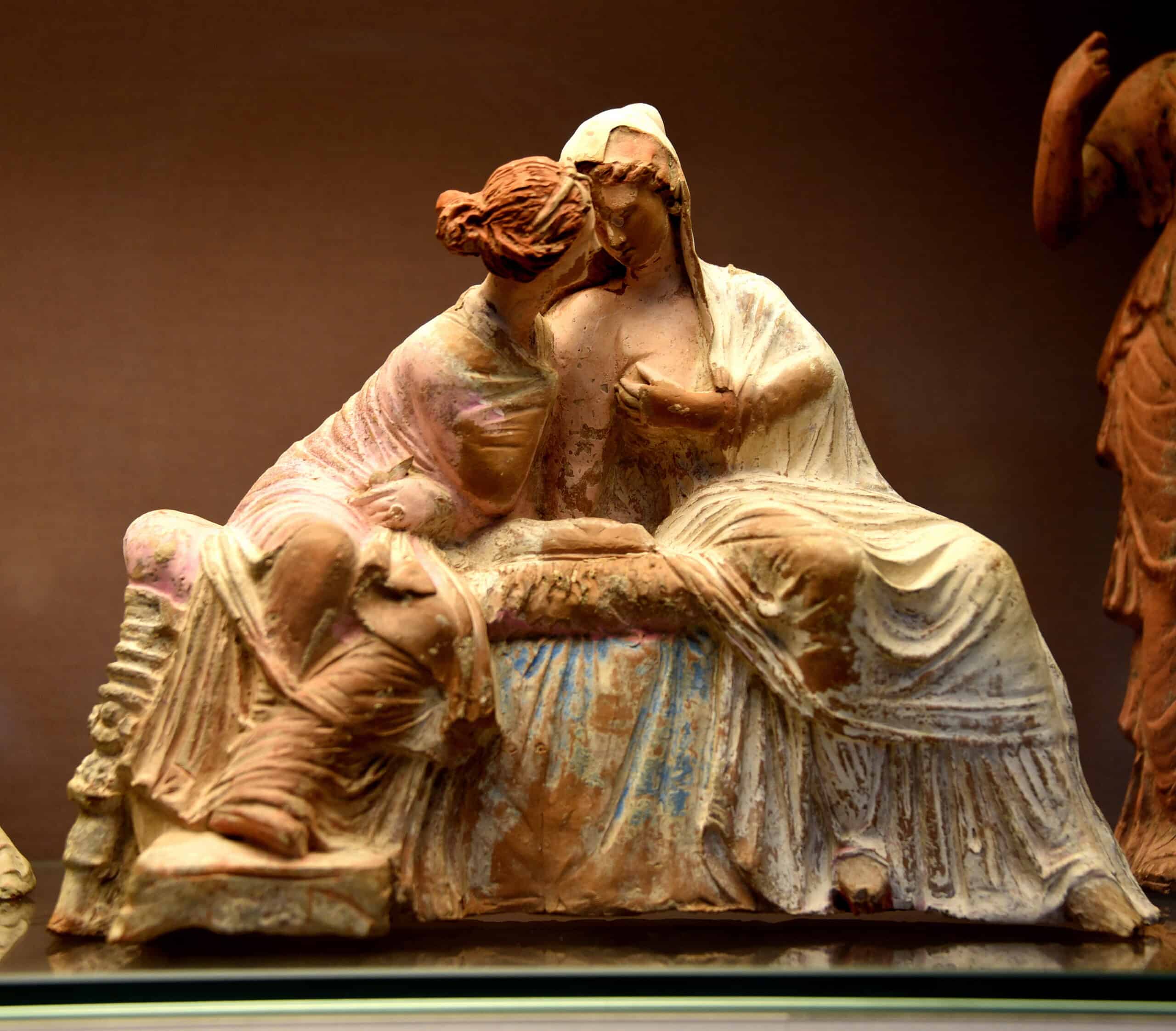
Demeter’s relationship with her daughter Persephone was a close and loving one. However, their bond was tested when Hades, the underworld god, abducted Persephone. Demeter was devastated by the loss of her daughter and searched the earth for her, neglecting her duties as the goddess of agriculture and causing widespread famine.
It is also said that Demeter’s brother Zeus impregnated her, which resulted in the birth of their daughter, Persephone. This incestuous relationship was not uncommon in Greek mythology, as the gods often engaged in such relationships with their siblings and other family members.
In conclusion, Demeter had several relationships with gods, including Zeus and Poseidon. However, her most significant relationship was with her daughter, Persephone. Her relationship with Zeus was not happy, and her rejection of Poseidon’s advances caused a widespread drought. The abduction of Persephone by Hades tested her bond with her daughter, and her incestuous relationship with Zeus resulted in the birth of Persephone.
Husband and Children
Demeter, the Greek goddess of agriculture, was known to have two brothers: Zeus and Poseidon. Zeus, the king of the gods, was married to his sister Hera, but he had numerous affairs with other goddesses and mortal women. Demeter was one of his lovers, and they had a child named Persephone.
Poseidon, on the other hand, was known for his rivalry with Demeter. He was the god of the sea and earthquakes and often clashed with Demeter over territory. Despite their differences, some myths suggest that Poseidon also had a romantic interest in Demeter, but she rejected his advances.
Demeter’s relationship with Persephone is one of the most famous in Greek mythology. Hades abducted Persephone, the god of the underworld, and taken to the underworld to become his queen. Demeter was devastated by her daughter’s disappearance and searched for her relentlessly. Eventually, she learned that Hades had taken Persephone and demanded her return. However, because Persephone had eaten six pomegranate seeds while in the underworld, she was forced to spend six months of every year with Hades; during this time, Demeter mourned her daughter’s absence and allowed the crops to wither and die.
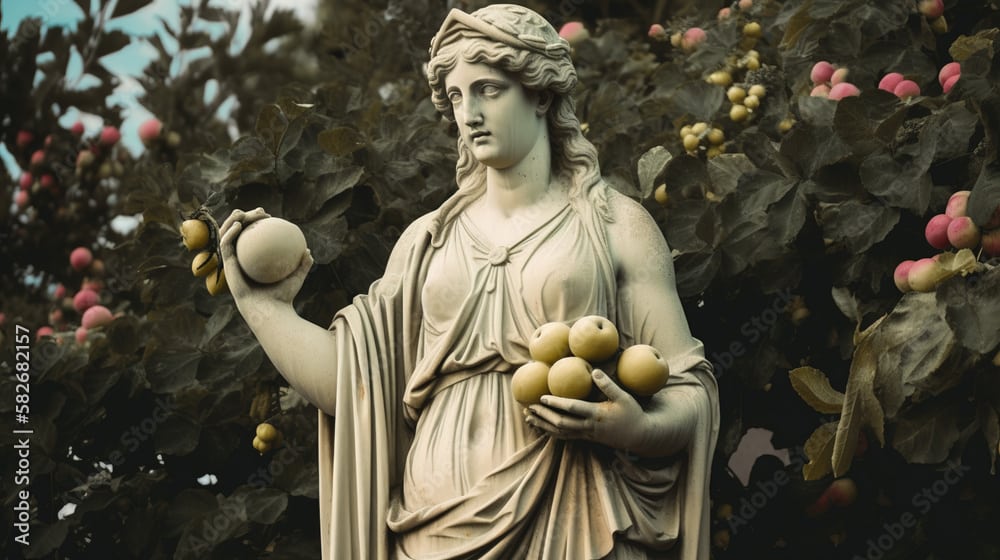
It is worth noting that in some versions of the myth, Zeus impregnated Demeter by disguising himself as a stallion. This act of bestiality was not uncommon in Greek mythology and was often used to explain why certain gods and goddesses had animalistic traits or offspring. While this aspect of the myth may seem disturbing to modern readers, it was not seen as taboo in ancient Greece.
Demeter’s relationships with Zeus, Poseidon, and Persephone were complex and multifaceted. While she had a child with Zeus and a contentious relationship with Poseidon, her love for her daughter Persephone was unwavering, even in the face of tragedy.
Powers and Symbols
Demeter was known for her vast array of powers, including her ability to control the earth’s fertility, vegetation, and agriculture. She was also associated with the cycle of life and death, as she was responsible for crops’ growth and harvest, representing the cycle of life. Demeter was often depicted carrying a sickle, symbolizing her power over the crops and the harvest.
One of the most significant symbols associated with Demeter was the cornucopia, a symbol of abundance and prosperity. She was also associated with wheat, as she was the goddess of agriculture and the earth’s fertility. Additionally, Demeter was often depicted with a torch, symbolizing her search for her daughter, Persephone, whom Hades abducted.
Demeter was among the twelve Olympians, and her relationship with Zeus and Poseidon was complex. She was the sister of both Zeus and Poseidon and while she had a good relationship with Zeus, she was not on good terms with Poseidon. Poseidon had attempted to rape Demeter, and she had to flee from him by turning herself into a mare.
Demeter’s relationship with her daughter, Persephone, was also significant. Persephone was abducted by Hades, who took her to the underworld. Demeter searched for her daughter tirelessly, and her grief caused the earth to become barren. Eventually, Zeus intervened and arranged for Persephone to spend six months of the year in the underworld with Hades and six months on earth with Demeter. This arrangement became the basis for the seasons, with the barren winter months representing the time when Persephone was in the underworld and the fertile spring and summer months representing the time when she was on earth with Demeter.
One of the lesser-known aspects of Demeter’s mythology is her relationship with her brother, Zeus. According to some accounts, Zeus impregnated Demeter, and she gave birth to a daughter named Persephone. This myth has been interpreted in different ways, with some scholars suggesting that it represents the integration of pre-existing goddess worship into the patriarchal structure of Greek mythology.
Overall, Demeter was a powerful goddess associated with fertility, agriculture, and the cycle of life and death. Her relationships with Zeus, Poseidon, and Persephone were complex and significant, and her symbols and iconography reflected her power and influence over the natural world.
Myths
Demeter, the Greek goddess of agriculture, was a powerful deity with a complex mythology. Her relationships with Zeus and Poseidon were significant parts of her story. As the sister of Zeus, Demeter was a member of the Olympian gods. She had a contentious relationship with her brother Poseidon, who raped her in some versions of the myth.
However, the most famous myth involving Demeter is the story of her daughter Persephone. According to the myth, the underworld god Hades abducted Persephone and took her to his realm. Demeter was so distraught that she withdrew her powers from the earth, causing a famine. Zeus eventually intervened and brokered a deal with Hades, which allowed Persephone to spend half the year in the underworld and half the year with her mother. This myth is often seen as a metaphor for changing the seasons.
The relationship between Demeter and Persephone is a central theme in many of the myths associated with the goddess. In some versions of the myth, Demeter is so distraught over losing her daughter that she refuses to allow anything to grow on the earth. In others, she sends Hermes to retrieve her daughter from the underworld.
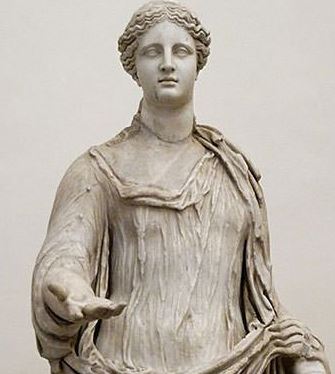
The story of Demeter and Persephone is also notable because Demeter’s brother Zeus impregnated her. This incestuous relationship resulted in the birth of Persephone. This aspect of the myth is often seen as a reflection of the complex relationships between the gods in Greek mythology.
Overall, the myths surrounding Demeter are rich and complex, reflecting the importance of agriculture in ancient Greek society. Her relationships with Zeus, Poseidon, and Persephone are central to her story and continue to captivate readers and scholars alike.
Interesting Facts
Demeter is one of the most important deities in Greek mythology and is often associated with agriculture, fertility, and the cycle of life and death. Here are some interesting facts about the Greek goddess:
- Relationship with Zeus: Demeter was the sister of Zeus and one of the twelve Olympian gods. According to mythology, Zeus seduced Demeter, and she bore him a daughter named Persephone.
- Relationship with Poseidon: Demeter was also known for her feud with Poseidon, the sea god. Poseidon had raped Demeter’s daughter Persephone, which led to Demeter’s grief and anger. This event is said to have caused the changing of the seasons, as Demeter would only allow the earth to be fertile when Persephone was with her.
- Relationship with Persephone: Demeter’s relationship with Persephone is one of the most well-known stories in Greek mythology. Persephone was abducted by Hades, the god of the underworld, and taken to the underworld. Demeter’s grief at losing her daughter caused the earth to become barren, which led to a famine. Eventually, Zeus intervened and compromised with Hades, allowing Persephone to spend part of the year with her mother and part of the year in the underworld.
- Brother impregnated her: According to some versions of the myth, Demeter was impregnated by her brother, Zeus. This led to the birth of a son named Plutus, the god of wealth.
Demeter was also associated with the Eleusinian Mysteries, a religious festival that celebrated the cycle of life, death, and rebirth. The festival was held in honor of Demeter and Persephone and was considered one of the most critical events in ancient Greece. Additionally, Demeter was often depicted holding a torch, representing her role as a bringer of light and fertility.
Overall, Demeter was a complex and powerful goddess who played an important role in Greek mythology and culture. Her relationships with Zeus, Poseidon, and Persephone were central to her story, and her association with agriculture and fertility made her an essential figure in the daily lives of ancient Greeks.
Frequently Asked Questions
What is Demeter known for?
Demeter is the Greek goddess of agriculture, harvest, and fertility. She is often depicted holding a sheaf of wheat or cornucopia, symbolizing her association with agriculture and abundance.
What are Demeter’s powers?
Demeter has the power to control the earth’s fertility, and she is often associated with changing seasons. She can also control the growth of crops and vegetation and is often invoked by farmers to ensure a bountiful harvest.
How did Zeus and Demeter have a child?
According to Greek mythology, Zeus and Demeter had a child named Persephone. However, there are different versions of the myth. In some versions, Zeus impregnated Demeter, while in others, Persephone was conceived through a union with Demeter’s brother, Poseidon.
What is Demeter’s myth?
One of the most well-known myths involving Demeter is the story of her daughter Persephone’s abduction by Hades, the god of the underworld. Demeter was so distraught by her daughter’s disappearance that she withdrew her gifts of fertility from the earth, causing a devastating famine. Eventually, Zeus intervened and brokered a deal that allowed Persephone to spend half the year with Hades in the underworld and half the year with Demeter on Earth, thus explaining the changing seasons.
Who was Demeter?
Demeter was one of the twelve Olympian gods and goddesses, the children of Cronus and Rhea. She was the sister of Zeus, Poseidon, Hades, Hera, and Hestia.
Where did Demeter live?
Demeter was worshipped throughout ancient Greece, but her most important sanctuary was in Eleusis, near Athens. The Eleusinian Mysteries, a series of secret religious rites that honored Demeter and her daughter Persephone, were held there every year.

